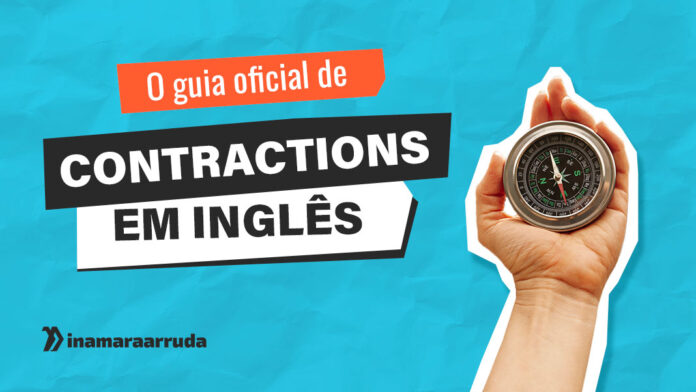Ao ler algo ou durante uma conversa, você já percebeu algumas palavras abreviadas? Essas “abreviações” são chamadas CONTRACTIONS, e tornam a linguagem mais rápida e fácil por encurtarem as palavras.
As CONTRACTIONS são usadas principal em contextos INFORMAIS, mas como são muito comuns, não é difícil vermos em contextos mais formais também. Essas CONTRAÇÕES foram inseridas na língua oficial inglesa muito tempo atrás, e se engana quem pensa que os antigos não usavam CONTRACTIONS. Há registros do século XVII em que podemos notar CONTRACTIONS em cartas, textos e em poemas.
Fazendo uma pesquisa rápida, pode-se dizer que na língua inglês temos um pouco mais de 90 CONTRACTIONS, isso contando com as CONTRACTIONS não oficiais. Muita coisa, né? Então, hoje eu decidi trazer um GUIA COMPLETO de CONTRACTIONS. Segue o fio:
1. AFFIRMATIVE
I. I’m – I am
I’m happy to announce our pregnancy.
Estou feliz em anunciar nossa gravidez.
II. I’ll – I will
Wait a minute and I’ll tell you everything that happened.
Espere um minuto e eu vou te contar tudo o que aconteceu.
III. I’d – I had / I would
It’s so horrible, I’d never wear that.
É tão horrível, eu nunca usaria isso.
IV. I’ve – I have
I’m pretty sure I‘ve made the wrong decisions.
Tenho certeza de que tomei as decisões erradas.
V. She’s – She’s / She has
She’s not so sure about it, we’d better wait.
Ela não tem tanta certeza disso, é melhor esperarmos.
VI. She’ll – She will
She’ll talk to you in a minute, hang on.
Ela vai falar com você em um minuto, espere.
VII. She’d – She had / She would
When I arrived she‘d already left for work, we didn’t get to talk.
Quando cheguei ela já tinha saído para o trabalho, não conseguimos conversar.
VIII. He’s – He is / He has
I’m dating David, but he’s not the father of my son.
Estou namorando o David, mas ele não é o pai do meu filho.
IX. He’ll – He will
He’ll have to leave soon, don’t take so long to return.
Ele vai ter que sair em breve, não demore tanto para voltar.
X. He’d – He had / He would
He’d been doing the same thing for hours.
Ele estava fazendo a mesma coisa por horas.
XI. It’s – It is / It has
It’s been a very long week, it’s time to get a rest.
Foi uma semana muito longa, é hora de descansar.
XII. It’ll – It will
I think it’ll take me a few hours to finish the project, so don’t wait for me.
Acho que vou levar algumas horas para terminar o projeto, então não espere por mim.
XIII. It’d – It had / It would
It’d been raining a lot lately, I’m worried I admit.
Tem chovido muito ultimamente, estou preocupado, admito.
XIV. We’re – We are
We’re never getting back together.
Nós nunca vamos voltar a ficar juntos.
XV. We’ve – We have
We’ve been together for 12 years and he’d never taken me on a trip.
Estamos juntos há 12 anos e ele nunca me levou em uma viagem.
XVI. We’ll – We will
We’ll get back together if you promise to change.
Nós voltaremos a ficar juntos se você prometer mudar.
XVII. We’d – We had / We would
We’d get back together if he promised me to change.
Nós voltaríamos a ficar juntos se ele me prometesse mudar.
XVIII. They’re – They are
Could you talk to the boys again? They’re making too much noise upstairs.
Você poderia falar com os meninos de novo? Eles estão fazendo muito barulho lá em cima.
XIX. They’ve – They have
They’ve been working together as a team for over a year.
Eles trabalham juntos como uma equipe há mais de um ano.
XX. They’ll – They will
Do you think they’ll be able to track down the murderers?
Você acha que eles serão capazes de rastrear os assassinos?
XXI. They’d – They had / They would
Man, they’re not insane, they’d never allow that to happen.
Cara, eles não são loucos, eles nunca permitiriam que isso acontecesse.
XXII. You’re – You are
When you’re in town could you pick up the books I ordered?
Quando você estiver no centro, você poderia pegar os livros que eu encomendei?
XXIII. You’ve – You have
These grades are good, but you’ve done better before.
Essas notas estão boas, mas você já foi melhor antes.
XXIV. You’ll – You will
You need to bear in mind that the longest relationship you’ll have is with yourself, so love yourself first.
Você precisa lembrar que a relação mais longa que você terá é consigo mesmo, então se ame primeiro.
XXV. You’d – You had / You would
Be careful going outside, snow has just melted, you’d better not wear these slippery shoes.
Tenha cuidado ao sair, a neve acabou de derreter, é melhor você não usar esses sapatos escorregadios.
XXVI. Would’ve – Would have
There are rumors that say the whole event would’ve cost half a million dollars.
Há rumores de que todo o evento teria custado meio milhão de dólares.
XXVII. Could’ve – Could have
Jack could’ve got the job, if he wasn’t so full of himself.
Jack poderia ter conseguido o emprego, se não fosse tão cheio de si.
XXVIII. Might’ve – Might have
She looks sad, something might’ve happened.
Ela parece triste, algo pode ter acontecido.
XXIX. May’ve – May have
She looks sad, something may’ve happened.
Ela parece triste, algo pode ter acontecido.
XXX. Must’ve – Must have
The repairs you made must’ve worked, because they didn’t say a word about it so far.
Os reparos que você fez devem ter funcionado, porque eles não disseram uma palavra sobre isso até agora.
XXXI. Should’ve – Should have
You should’ve known better than trying to fool me.
Você deveria saber que não deve tentar me enganar.
2. NEGATIVE
I. Isn’t – Is not
I’m dating David, but he isn’t the father of my son.
Estou namorando o David, mas ele não é o pai do meu filho.
II. Aren’t – Are not
Paul and George aren’t nice guys.
Paulo e Jorge não são caras legais.
III. Don’t – Do not
I don’t think it’s going to be more than 40 minutes. It’s a quick drive.
Eu não acho que vai levar mais de 40 minutos. É uma viagem rápida.
IV. Doesn’t – Does not
Having a routine can keep you more organized, focused and doesn’t make you feel so tired by the end of the week.
Ter uma rotina pode te manter mais organizado, focado e não te faz se sentir tão cansado pelo final da semana.
V. Didn’t – Did not
Sam didn’t seem too disappointed at losing. If anything, he seemed relieved that it was all over.
Sam não parecia muito desapontado por perder. Pelo contrário, ele parecia aliviado por tudo ter acabado.
VI. Wasn’t – Was not
Growing up I wasn’t very good at sports, so I told myself I hated it, but some weeks ago I started playing tennis on weekends with my neighbor, and now I think I’m addicted.
Crescendo eu não era muito boa em esportes, então disse pra mim mesmo que odiava, mas algumas semanas atrás eu comecei a jogar tênis com o meu vizinho, e agora eu acho que estou viciado.
VII. Weren’t – Were not
They weren’t at my house earlier, were they?
Eles não estavam na minha casa mais cedo, eles estavam?
VIII. Won’t – Will not
I’ve got amazing news! You won’t believe it.
Tenho uma notícia incrível! Você não vai acreditar.
IX. Haven’t – Have not
I believe we haven’t met yet. My name’s Dylan.
Acredito que ainda não nos conhecemos. Meu nome é Dylan.
X. Hasn’t – Has not
He hasn’t won a game since last year.
Ele não ganhou nenhum jogo desde o ano passado.
XI. Hadn’t – Had not
I almost wish I hadn’t invited her.
Eu quase desejei não tê-la convidado.
XII. Wouldn’t – Would not
The reporters wouldn’t stop hounding her.
Os repórteres não paravam de persegui-la.
XIII. Can’t – Cannot
We can’t afford to make any mistakes at this stage in the project.
Nós não podemos cometer qualquer erro neste estágio do projeto.
XIV. Couldn’t – Could not
I couldn’t help but hear your conversation with the other employees. Is there anything you want to talk about?
Eu não pude evitar em ouvir sua conversa com os outros funcionários. Tem algo que você queira conversar sobre?
XV. Shouldn’t – Should not
You shouldn’t tell me what to do. I’m a grown man.
Você não deveria me dizer o que fazer. Eu sou um homem crescido.
XVI. Mustn’t – Must not
You mustn’t smoke here.
Você não pode fumar aqui.
XVII. Mayn’t – May not
Visitors mayn’t take photographs in the museum.
Os visitantes não podem tirar fotos no museu.
XVIII. Shan’t – Shall not
I shan’t be able to stay with you very long.
Eu não devo conseguir ficar com você muito tempo.
3. QUESTIONS AND STATEMENTS
I. What’s – What is / What has
What’s the difference? I don’t see it.
Qual é a diferença? Eu não vejo isso.
II. What’re – What are
What’re the names of your parents?
Quais são os nomes dos seus pais?
III. What’ll – What will
What’ll be their next steps?
Quais serão seus próximos passos?
IV. What’d – What would / What did / What had
What’d you do yesterday?
O que você fez ontem?
V. What’ve – What have
What’ve you been doing lately?
O que você tem feito ultimamente?
VI. Where’s – Where is / Where has
Where’s the nearest restroom, please?
Onde fica o banheiro mais próximo, por favor?
VII. Where’re – Where are
Where’re the documents I asked you for?
Onde estão os documentos que eu pedi?
VIII. Where’ll – Where will
Where’ll you be during the concert?
Onde você estará durante o show?
IX. Where’d – Where would / Where did / Where had
Where’d you leave the documents I asked you?
Onde você deixou os documentos que eu lhe pedi?
X. Where’ve – Where have
Where’ve you been all day? I called you like 10 times.
Onde você esteve o dia todo? Liguei para você umas 10 vezes.
XI. When’s – When is / When has
When’s that going to happen?
Quando isso vai acontecer?
XII. When’re – When are
When’re your friends arriving? I need to finish the desserts.
Quando seus amigos chegam? Preciso terminar as sobremesas.
XIII. When’ll – When will
When’ll Chernobyl be inhabitable again? Do you know?
Quando Chernobyl voltará a ser habitável? Você sabe?
XIV. When’d – When would / When did / When had
When’d you mean to tell me what happened?
Quando você ia me dizer o que aconteceu?
XV. How’s – How is / How has
How’s the weather today? Should I take my umbrella?
Como está o tempo hoje? Devo levar meu guarda-chuva?
XVI. How’re – How are
How’re you doing, dude?
Como você está, cara?
XVII. How’ll – How will
How’ll the weather be tomorrow?
Como estará o tempo amanhã?
XVIII. How’d – How would / How did / How had
How’d you manage to finish that so fast?
Como você conseguiu terminar tão rápido?
XIX. How’ve – How have
How’ve you been lately?
Como você tem estado ultimamente?
XX. Which’s – Which is / Which has
Which’s faster, light or sound?
Qual é mais rápido, luz ou som?
XXI. Which’re – Which are
Which’re the options we have?
Quais são as opções que temos?
XXII. Which’ll – Which will
Which’ll you choose from the options they gave you?
Qual você vai escolher entre as opções que eles lhe deram?
XXIII. Which’d – Which would / Which did / Which had
Which’d you choose from the options they gave you?
Qual você escolheu entre as opções que eles lhe deram?
XXVI. Why’s – Why is / Why has
Why’s it so difficult to have a real conversation with you? You never seem to hear me.
Por que é tão difícil ter uma conversa real com você? Parece que você nunca me ouve.
XXVII. Why’re – Why are
Why’re these guys staring at us?
Por que esses caras estão olhando para nós?
XXVIII. Why’ll – Why will
Why’ll it take so long for you to answer the test? Isn’t it only 10 questions?
Por que vai demorar tanto para você responder ao teste? Não são apenas 10 perguntas?
XXIX. Why’d – Why would / Why did / Why had
Why’d I want to go to this party with you? You become such a dork around your friends and don’t even give me attention.
Por que eu gostaria de ir a essa festa com você? Você se torna um idiota perto de seus amigos e nem me dá atenção.
XXX. There’s – There is / There has
There’s only one carton of milk left. We should buy some more soon.
Só sobrou uma caixa de leite. Devemos comprar mais em breve.
XXXI. There’re – There are
There’re many things you can do to run away from sedentarism.
Há muitas coisas que você pode fazer para fugir do sedentarismo.
XXXII. There’d –There would / There had
I called yesterday, and they assured me there’d be a practice this morning before the actual event.
Liguei ontem e eles me garantiram que haveria um treino esta manhã antes do evento real.
XXXIII. There’ll – There will
If you don’t come right now there’ll be no food left for you.
Se você não vier agora não haverá/não sobrará mais comida para você.
XXXIV. There’ve – There have
There’ve been a time where I’d take the effort to… Well, never mind. You’re not listening anyway.
Houve um tempo em que eu me esforçava para… Bem, não importa. Você não está ouvindo de qualquer maneira.
XXXV. That’s – That is / That has
That’s exactly what I just said, why are you pretending I’m not even here?
Isso é exatamente o que eu acabei de dizer, por que você está fingindo que eu nem estou aqui?
XXXVI. That’ll – That will
That’ll lead us to failure, I’m pretty sure.
Isso nos levará ao fracasso, tenho certeza.
XXXVII. That’d – That would / That did / That had
When I told you that’d take us longer to arrive, I really meant it.
Quando eu lhe disse que levaríamos mais tempo para chegar, eu estava falando sério.
XXXVIII. These’re – These are
These’re my friends Julia and Amanda.
Estas são as minhas amigas Julia e Amanda.
XXXIX. These’ve – These have
These’ve been the best years of my life.
Estes foram os melhores anos da minha vida.
XXXX. Those’re – Those are
Those’re the laptops I told you about. Do you think there’s any chance for them to be fixed or should I buy new ones?
Esses são os laptops que eu te disse. Você acha que há alguma chance de eles serem consertados ou devo comprar novos?
XXXXI. Those’ve – Those have
Those’ve been the best years of her life, she mentioned.
Esses foram os melhores anos de sua vida, ela mencionou.
XXXXII. Here’s – Here is / Here has
Thank you, here’s your ticket. Have a nice day!
Obrigado, aqui está o seu ingresso. Tenha um bom dia!
4. ODD ONES ‘n’ INFORMALS
I. Ain’t – Am not / Is not / Has not / Have not
I ain’t that good at understanding people’s emotions.
Eu não sou tão bom em entender as emoções das pessoas.
II. Amn’t – Am not
I amn’t sure, but I think she is addicted to it.
Eu não tenho certeza, mas acho que ela está viciada nisso.
III. ‘n’ – And
You ‘n’ me are meant to be together, baby.
Você e eu estamos destinados a ficar juntos, baby.
IV. ‘bout – About
I’m doing great, what ‘bout you?
Estou indo muito bem, e você?
V. He’d’ve / She’d’ve – He would have / She would have
He’d’ve been so happy to see Mary before she left.
Ele teria ficado tão feliz em ver Mary antes que ela partisse.
VI. Ma’am – Madam
I’m sorry ma’am, could you repeat that, please?
Desculpe senhora, pode repetir isso, por favor?
VII. ‘cause – Because
The journey was quite quick ‘cause the road was clear.
A viagem foi bem rápida porque a estrada estava livre.
VIII. O’clock – Of clock
I’m meeting you tomorrow at 11 o’clock, okay?
Te encontro amanhã às 11 horas, ok?
IX. ‘tis – This is
Well, ‘tis is great, I mean we’ll get to be together a little longer.
Bem, isso é ótimo, quero dizer, vamos ficar juntos um pouco mais.
X. ‘twas – It was
Over 300 people attended the lecture, ‘twas a total success.
Mais de 300 pessoas participaram da palestra, foi um sucesso total.
XI. ‘twere – It were
Over 300 people attended the lecture, ‘twere a total success.
Mais de 300 pessoas participaram da palestra, foi um sucesso total.
XII. Dunno – I don’t
What? Dunno what you’re talking about.
Que? Não sei do que você está falando.
XIII. D’ya – Do you
D’ya love me?
Você me ama?
XIV. ‘em – Them
Give ‘em what they want and they’ll leave us alone.
Dê a eles o que eles querem e eles nos deixarão em paz.
XV. Arencha – Aren’t you
Arencha going to meet your friend soon? You’re gonna be late.
Você não vai encontrar seu amigo em breve? Você vai se atrasar.
XVI. Whatcha – What are you
Whatcha doing tonight?
O que você está fazendo esta noite?
XVII. Gimme – Give me
Gimme what I want, bro!
Me dê o que eu quero, mano!
XVIII. G’day – Good day
G’day, can I help you?
Bom dia, posso te ajudar?
XIX. Imma – I’m going to
Next month Imma buy an XBox.
No próximo mês eu vou comprar um XBox.
XX. Innit – Isn’t it?
It has happened before, innit?
Já aconteceu antes, não é?
XXI. Kinda – Kind of
I kinda need your help.
Eu meio que preciso de sua ajuda.
XXII. Needn’t – Need not
Needn’t to say that they all failed, right?
Nem preciso dizer que todos falharam, certo?
XXIII. ‘round – Around
When are you coming ‘round?
Quando você vem por aqui?
XXIV. Til – Until
You promised we’d be together ‘til the end.
Você prometeu que ficaríamos juntos até o fim.
XXV. Y’know – You know
Y’know what I mean, right?
Você sabe o que quero dizer, certo?
XXVI. Y’ain’t – You are not
Y’ain’t that smart as much as you think.
Você não é tão inteligente quanto pensa.
XXVII. Y’all – You all
Hey, y’all come over here right now.
Ei, vocês venham aqui agora.
XXVIII. Y’all’d’ve – You all would have
Y’all’d’ve been so great together as a team.
Vocês seriam tão bons juntos como uma equipe.
XXIX. Y’all’re – You all are
Y’all’re so wrong about it.
Vocês estão tão errados sobre isso.
XXX. Y’all’ren’t – You all are not
Y’all’ren’t so wrong about it.
Vocês não estão tão errados sobre isso.
XXXI. Y’at – You at
Where are y’at?
Onde você está?
XXXII. I’m’o – I’m going to
Next month I’m’o buy an XBox.
No próximo mês eu vou comprar um XBox.
XXXIII. I’d’ve – I would have
If I’d known better, I’d’ve said sorry earlier.
Se eu soubesse melhor, eu teria pedido desculpas antes.
XXXIV. I’d’nt – I would not
If I were you say I’d’nt say that.
Se eu fosse você diria que eu não diria isso.
XXXV. I’d’nt’ve – I would not have
If I’d known better, I’dnt’ve said that to him.
Se eu soubesse melhor, eu não teria dito isso a ele.
XXXVI. Ion – I don’t
Ion think you should call her.
Eu não acho que você deveria ligar para ela.
XXXVII. To’ve – To have
You need to’ve more practice before hitting the road.
Você precisa ter mais prática antes de pegar a estrada.
XXXVIII. W’all – We all
W’all are tired of this bullshit.
Todos estão cansados dessa merda.
XXXIX. W’at – We at
Why are you asking where were w’at?
Por que você está perguntando onde estávamos?
XXXX. Wanna – Want to
What do you wanna do?
O que você quer fazer?
XXXXI. Gonna – Going to
I’m gonna leave.
Eu vou sair.
XXXXII. Gotta – Got to
I gotta talk to her.
Eu tenho que falar com ela.
XXXXIII. Trynna – Trying to
I’m trynna be okay, but seeing you with him just doesn’t feel right.
Estou tentando ficar bem, mas ver você com ele não parece certo.
XXXXIV. Yessir – Yes, sir
“Did you get my messages?” “Yessir!”
“Você recebeu minhas mensagens?” “Sim senhor!”
XXXXV. Yes’m – Yes, madam
“Did you get my messages?” “Yes’m!”
“Você recebeu minhas mensagens?” “Sim senhora!”
XXXXVI. Gon’t – Go not
It’s no use insisting, I gon’t tell you what happened.
Não adianta insistir, não vou contar o que aconteceu.
XXXXVII. Willn’t – Will not
It’s no use insisting, I willn’t tell you what happened.
Não adianta insistir, não vou contar o que aconteceu.
Espero que tenha gostado do conteúdo. Não deixe de adicionar o novo vocabulário no seu ANKI para não deixar as #novidades caírem na curva do esquecimento.
Aproveite e me siga nas redes sociais. Participe das nossas lives todas as terças-feiras no YouTube e entre para o meu grupo do TELEGRAM, onde eu envio dicas, conteúdos e muita informação bacana. Para entrar no grupo, basta tocar no botão abaixo!
Stay Strong. 😉









